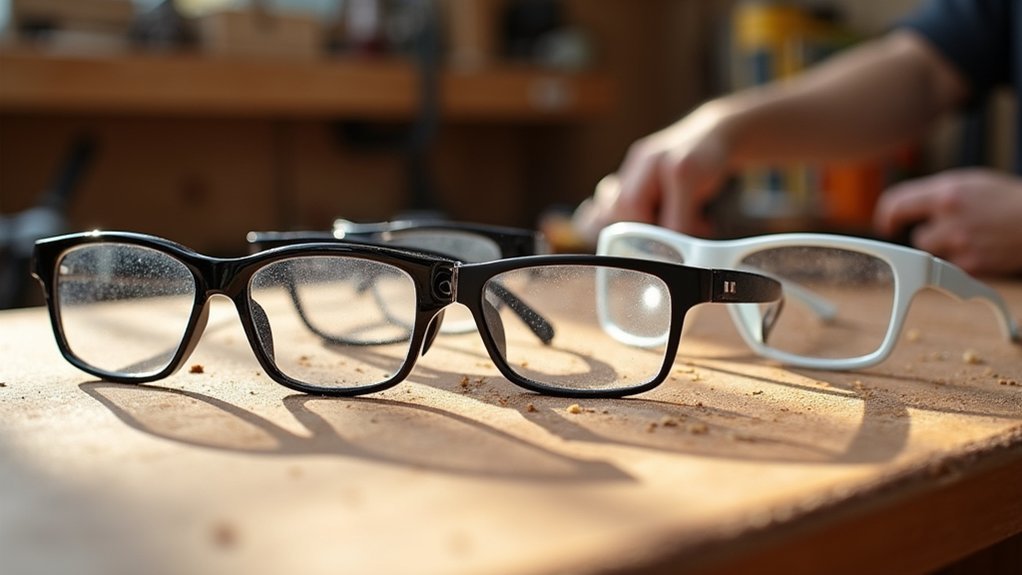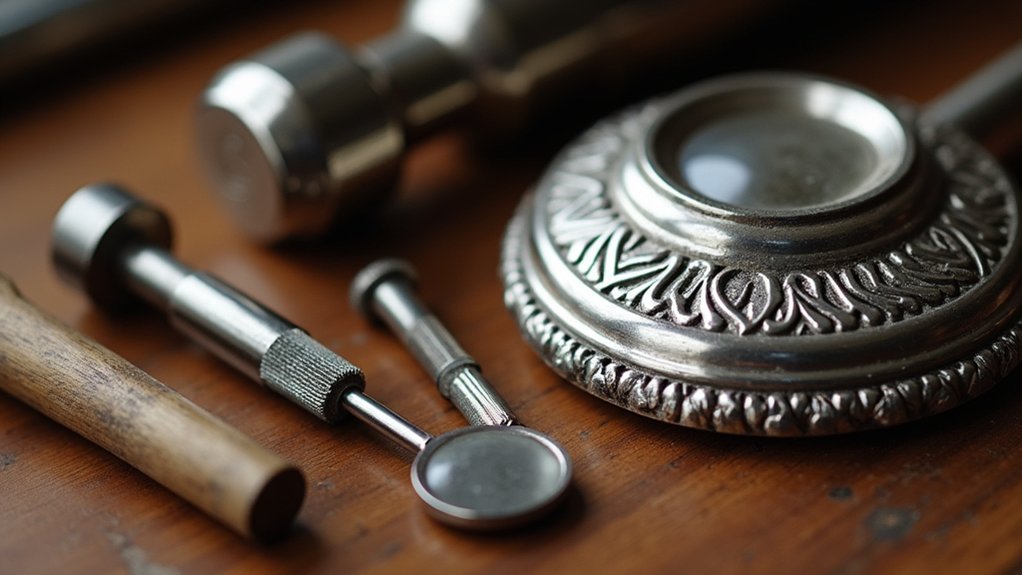When you’re engaged in precision tasks, foggy safety glasses can turn from protection to frustration in seconds. You’ve likely experienced that moment—leaning in for a detailed cut or measurement only to have your vision cloud over at the critical moment. Finding eyewear that stays clear regardless of temperature changes or your breathing pattern isn’t just about comfort—it’s about maintaining safety and efficiency. Let’s explore five anti-fog options that will keep your vision crystal clear when it matters most.
BISON LIFE Safety Glasses – Scratch Resistant Wrap Around Eyewear
If you’re constantly frustrated by foggy safety glasses, BISON LIFE’s wrap-around eyewear offers a practical solution for environments where visibility is essential. These lightweight polycarbonate glasses meet ANSI Z87.1 standards, protecting you from flying particles and debris.
You’ll appreciate their versatility across medical, construction, and educational settings. The universal fit works for adults, teens, and older children, while the scratch-resistant coating guarantees lasting clarity. At roughly $1 per pair in the 12-pack, you’ll have plenty of backups when needed.
With 4.6/5 stars from over 7,600 ratings, these glasses deliver comfort and protection without breaking your budget.
Best For: Workers and professionals who need reliable eye protection in environments with flying debris or particles, including construction sites, laboratories, medical facilities, workshops, and educational settings.
Pros:
- Meets ANSI Z87.1 safety standards while offering wraparound protection that shields eyes from multiple angles
- Extremely affordable at approximately $1 per pair, making it practical to keep multiple backup pairs available
- Lightweight design and universal fit make them comfortable for extended wear by adults, teens, and older children
Cons:
- While scratch-resistant, they may still show wear with regular use in harsh environments
- Basic design lacks anti-fog coating, which could be problematic in humid or temperature-changing environments
- Clear lenses don’t offer tinting options for outdoor work or protection against bright light/glare
NoCry Safety Goggles Over Glasses with Impact Resistance
Professional glasses-wearers facing the dual challenge of eye protection and clear vision will appreciate NoCry Safety Goggles. These ANSI Z87.1 certified goggles fit comfortably over prescription eyewear while providing extreme impact resistance up to 260 mph.
The unique angled vents minimize fogging—a vital feature during detailed work—while the anti-fog and anti-scratch coatings enhance visibility. You’ll benefit from the wraparound design with wide-angle lenses offering complete peripheral protection.
With an adjustable strap and soft TPR seal, they’re comfortable for all-day wear. The 4.5-star average from over 3,600 users confirms their reliability for lab work, construction, and other precision tasks.
Best For: Laboratory technicians, construction workers, and professionals who wear prescription glasses and need reliable eye protection that allows for all-day comfort without sacrificing safety or visibility.
Pros:
- Designed to fit comfortably over most prescription glasses while providing ANSI Z87.1 certified protection against high-velocity impacts up to 260 mph
- Features anti-fog and anti-scratch coatings with unique angled vents that minimize fogging during detailed work
- Includes adjustable straps and soft TPR seal for a secure, comfortable fit that blocks dust and debris
Cons:
- Some users report minor fogging issues during intense physical activities despite the anti-fog coating
- At 3.2 ounces, they may feel slightly heavier than standard safety glasses when worn for extended periods
- No included hard case for storage and protection when not in use
Safety Glasses, ANSI Z87.1 Certified Protective Eyewear
Safety glasses that meet ANSI Z87.1 certification standards offer essential protection for anyone working in hazardous environments, while addressing the common frustration of fogging lenses.
These scratch-resistant glasses provide comfort for extended wear without causing visual distortion. You’ll find them ideal for shop environments, whether for your personal use or to offer visitors who forgot their eyewear.
While some users report broken arms upon unboxing, others have used them successfully for years, even in demanding settings like operating rooms. They’re designed to resist fogging and stay securely in place during detailed work.
Consider buying in bulk for workplace settings, but be aware that occasional replacements may be needed due to scratching over time.
Best For: Individuals and businesses needing reliable eye protection in industrial, laboratory, construction, or healthcare environments where flying debris or hazardous materials are present.
Pros:
- Meets ANSI Z87.1 certification standards, ensuring proper eye protection in hazardous environments
- Comfortable enough for extended wear without causing visual distortion or discomfort
- Resistant to fogging and stays securely in place, making them suitable for detailed work
Cons:
- Some quality control issues with broken arms reported upon unboxing
- May require replacement over time due to scratching, especially with regular use
- Individual fit may vary, potentially affecting comfort for some users
Stoggles Z87.2 Certified Polycarbonate Safety Glasses with Blue-Light Blocking
Healthcare workers, lab technicians, and anyone wearing face masks will appreciate Stoggles’ dual-side anti-fog coating that maintains visibility in demanding environments. These lightweight polycarbonate glasses offer complete protection with top and side shields against splashes and debris.
You’ll benefit from the blue-light and 100% UV blocking features during long screen sessions. The angular square design fits smaller faces well (47mm lens, 19mm bridge, 140mm temple), complementing softer facial features.
To extend the anti-fog coating’s life up to six months, clean with the included microfiber pouch or rinse with warm water—avoid lens sprays and extreme heat.
Best For: Healthcare professionals, lab workers, and individuals with smaller faces seeking stylish safety glasses that offer blue-light protection and anti-fog capabilities during mask wear.
Pros:
- Comprehensive protection with Z87.2 certification, top and side shields against splashes, and blue-light/UV blocking technology
- Dual-side anti-fog coating maintains visibility when worn with masks in high-humidity environments
- Lightweight polycarbonate construction with an ergonomic design specifically sized for smaller faces
Cons:
- Anti-fog coating requires special care and only lasts up to six months even with proper maintenance
- Limited size options may not accommodate larger face shapes or features
- No mention of prescription lens pricing or process details despite being advertised as Rx friendly
Radians Extremis Safety Glasses with Clear Anti-Fog Lens
Workers in dusty or humid environments will appreciate the Radians Extremis Safety Glasses with their foam-lined frame that offers extra protection against debris. Featuring a modern full-frame design, these ANSI Z87.1+ certified glasses provide 99.9% UV protection while maintaining a stylish look.
The soft rubber nose pads guarantee comfort during extended wear, though some users report the fit runs tight. Despite the anti-fog coating, they may still fog in extremely humid conditions. At just 0.01 ounces, they’re remarkably lightweight for all-day use in fabrication, construction, or outdoor work situations.
Best For: Workers seeking affordable, lightweight eye protection in dusty environments who need full-frame safety glasses with UV protection that meet ANSI safety standards.
Pros:
- Foam-lined frame provides superior dust and debris protection compared to standard safety glasses
- Extremely lightweight at just 0.01 ounces, making them comfortable for all-day wear
- Offers 99.9% UV protection while meeting ANSI Z87.1+ safety certification standards
Cons:
- Anti-fog coating may be ineffective in high humidity environments despite its marketing claims
- Some users report a tight fit that may cause discomfort during extended wear
- No adjustable features to customize the fit for different face shapes and sizes
Factors to Consider When Choosing Safety Glasses That Won’t Fog During Detailed Work
When you’re selecting safety glasses for detailed work, you’ll need to evaluate several key factors to guarantee they won’t fog at critical moments. You should check the quality of anti-fog coatings, assess the ventilation system design, verify compatibility with prescription eyewear, and confirm the durability of lens materials. These considerations will help you find safety glasses that maintain clear vision when precision matters most.
Factors to Consider When Choosing Safety Glasses That Won’t Fog During Detailed Work
Selecting the right safety glasses can make all the difference between clear vision and frustrating fog disruptions during precision tasks. Look for models with anti-fog coatings specifically designed to maintain clarity during intense work or in humid environments.
Consider glasses with adjustable ventilation systems that promote airflow and prevent moisture buildup. A proper fit is vital—choose eyewear that creates an effective seal around your eyes to minimize temperature differences that cause fogging.
Polycarbonate lenses offer advantages beyond standard materials, providing lighter weight and better thermal resistance to maintain visibility. Don’t overlook certification—ensure your safety glasses meet ANSI Z87.1 standards, which guarantees they’ll provide reliable protection while reducing fog-related interruptions during your detailed work.
Anti-Fog Coating Quality
The quality of anti-fog coating represents perhaps the most important feature when evaluating fog-resistant safety glasses. High-quality coatings contain hydrophilic chemicals that distribute moisture evenly across your lenses, effectively preventing fog buildup during detail-oriented tasks.
While premium anti-fog treatments can last up to six months, their performance will inevitably diminish over time, especially with frequent cleaning. To maximize coating longevity, you’ll need to clean your lenses with microfiber cloths and avoid harsh chemicals that can degrade the treatment.
Remember that temperature fluctuations can greatly impact coating effectiveness, so consider your specific work environment when selecting eyewear. Proper maintenance and storage aren’t optional—they’re essential practices that extend coating life and guarantee consistent clarity when you need it most.
Ventilation System Design
Effective ventilation systems distinguish truly fog-resistant safety glasses from mediocre alternatives. When selecting safety eyewear, look for strategically placed angled vents that create airflow patterns to reduce moisture buildup while maintaining protection against debris.
You’ll want to examine how the ventilation works with the frame design. The best systems feature soft seals around the edges that block dust while allowing efficient air circulation. These seals, combined with adjustable straps for a customized fit, prevent warm air from becoming trapped against your lenses.
For ideal results, choose glasses that combine quality ventilation with anti-fog coatings. This dual approach maximizes clarity during detailed work by addressing moisture from multiple angles. The ventilation extends the effectiveness of the coating, giving you longer periods of clear vision during demanding tasks.
Fit Over Prescription Eyewear
Workers who require prescription glasses face unique challenges when selecting safety eyewear that won’t fog. You’ll want to find safety glasses specifically designed to fit over your prescription frames, with adjustable straps and wraparound designs that minimize gaps.
Look for models featuring soft TPR seals that block dust while providing a comfortable fit over your existing eyewear. These seals create a protective barrier without compromising comfort during extended wear.
Proper ventilation remains essential even with over-prescription designs. Choose safety glasses with angled vents that reduce fogging while maintaining clear visibility for detailed tasks.
Always verify that your chosen eyewear meets ANSI Z87.1 certification standards, ensuring adequate impact protection while accommodating your prescription glasses. This certification guarantees you’re getting safety equipment that protects your eyes without sacrificing comfort or clarity.
Lens Material Durability
Beyond finding the right fit, understanding lens material durability will determine how well your safety glasses stand up to daily use. Polycarbonate lenses dominate the market for good reason—they’re lightweight yet offer exceptional impact resistance and shatter-proof qualities that protect your eyes during detailed work.
Look for lenses with scratch-resistant coatings that preserve clarity over time. These coatings prevent the tiny abrasions that can compromise visibility and become distracting during precise tasks. For fog prevention, specialized anti-fog coatings are vital but require proper care to maintain effectiveness.
You’ll extend your anti-fog coating’s lifespan through regular maintenance and correct cleaning methods. When selecting safety glasses, prioritize polycarbonate lenses with both scratch-resistant and anti-fog treatments to guarantee consistent performance and the 99.9% UV protection you need.
Weight For Extended Wear
Comfort during extended tasks hinges considerably on your safety glasses’ weight. When you’re focused on detailed work for hours, every ounce matters. Opt for models under 4 ounces to prevent fatigue and discomfort that can distract from your precision tasks.
Lightweight polycarbonate designs offer the ideal balance between protection and comfort, providing robust impact resistance without the burden of heavier materials. You’ll notice the difference particularly around pressure points on your nose and ears during all-day wear.
Proper fit works hand-in-hand with weight considerations. Glasses that are too tight create uncomfortable pressure, while loose frames require constant adjustment, interrupting your workflow. Users consistently report better concentration and productivity when wearing lightweight safety glasses that don’t remind you they’re there.
Certification Standards Compliance
When selecting safety glasses for detailed work, verifying ANSI Z87.1 certification should be your first priority. This certification guarantees your eyewear has passed rigorous testing for impact resistance and optical clarity—essential safeguards against flying debris in hazardous environments.
Don’t overlook the “Z87+” marking, which indicates high-impact protection. For fog-free performance, specifically look for models with anti-fog certification, as these are designed to maintain clear vision in humid or variable temperature conditions.
Many quality glasses also offer UV protection certification, which you’ll appreciate during outdoor work or extended wear under bright lighting. Remember to check if the manufacturer complies with the latest standards, as safety regulations evolve. Current compliance isn’t just about meeting requirements—it’s about guaranteeing your eyes receive the best protection during your most detailed tasks.
Frequently Asked Questions
Can Prescription Lenses Be Installed in Anti-Fog Safety Glasses?
Yes, you can add prescription lenses to anti-fog safety glasses. Many manufacturers offer this option, or you’ll need to consult an optician who can install custom prescription inserts into your safety frames.
How Often Should Safety Glasses Be Replaced?
You should replace your safety glasses when they’re scratched, damaged, or don’t fit properly anymore. Most manufacturers recommend replacement every 1-2 years with regular use, sooner if they’ve been impacted.
Are There Anti-Fog Safety Glasses for Extremely Humid Environments?
Yes, there are anti-fog safety glasses designed specifically for extremely humid environments. You’ll want ones with advanced anti-fog coatings, ventilation features, and dual-lens designs that prevent condensation even in high humidity conditions.
Can Anti-Fog Safety Glasses Be Worn With Respirators or Masks?
Yes, you can wear anti-fog safety glasses with respirators or masks. Look for models with adjustable temples, specialized coatings, and designs that accommodate face coverings without creating seal gaps or excessive pressure points.
Do Anti-Fog Coatings Eventually Wear off With Cleaning?
Yes, anti-fog coatings do eventually wear off with cleaning. You’ll notice diminished performance over time, especially if you’re using harsh chemicals or abrasive cloths. Most manufacturers recommend gentle cleaning with mild soap and water.





Leave a Reply